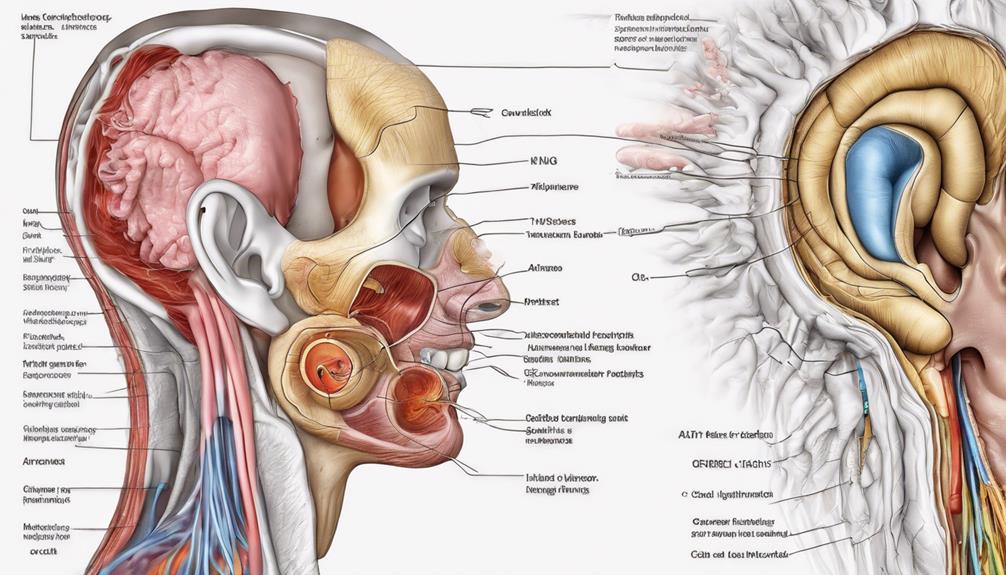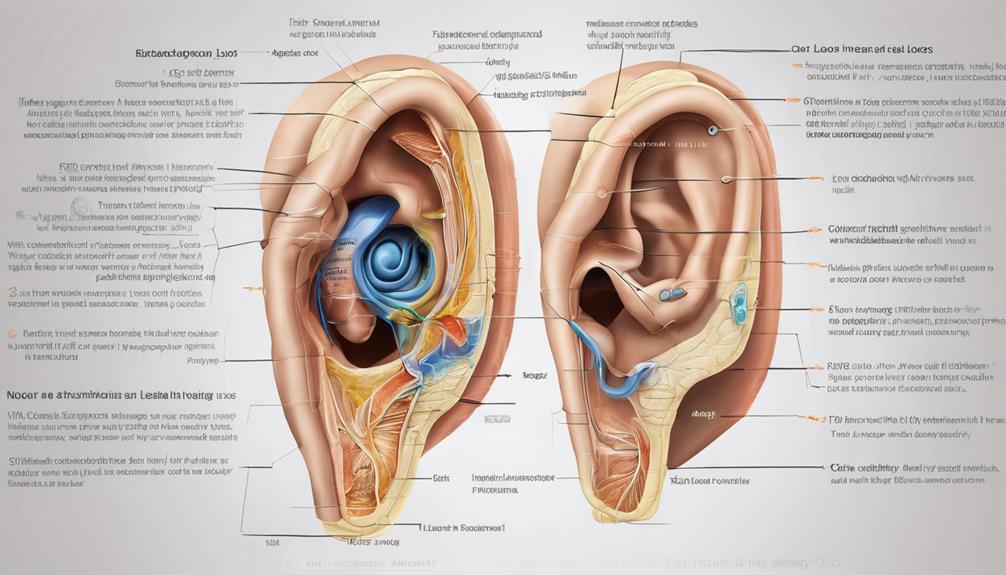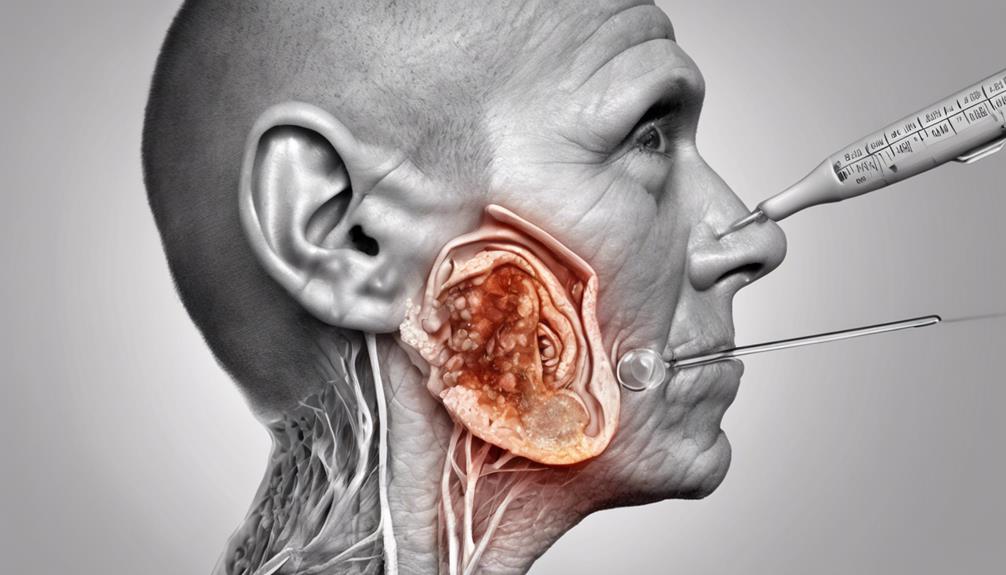Exploring the intricacies of low-frequency hearing impairment leads us into the realm of auditory challenges that necessitate a refined approach.
The subtle nuances of this condition often elude simplistic explanations, prompting a deeper investigation into its multifaceted origins.
As we navigate through the complexities of low-frequency hearing loss, intriguing insights emerge, shedding light on the intricate interplay of factors that shape its manifestation.
Stay tuned to unravel the layers of this enigmatic auditory phenomenon and discover the key to effective management and support.
Key Takeaways
- Low-frequency hearing loss stems from sensorineural or conductive issues.
- Identifying causes like genetics, noise exposure, Meniere's Disease, and aging is crucial.
- Symptoms include difficulty with deep tones, noisy environments, and reliance on visual cues.
- Treatment involves hearing aids, bone conduction devices, cochlear implants, and tailored strategies.
Types of Low-Frequency Hearing Loss
When identifying the types of low-frequency hearing loss, it's crucial to distinguish between sensorineural and conductive causes. Sensorineural low-frequency hearing loss relates to inner ear issues such as Meniere's disease or genetic mutations, affecting the ear's ability to transmit sound to the brain accurately. On the other hand, conductive low-frequency hearing loss often stems from middle ear problems like otosclerosis or otitis media, which impede sound conduction to the inner ear.
Individuals with low-frequency hearing loss may experience difficulties in perceiving specific sounds like deep bass tones or machinery rumbling. Understanding the differences between sensorineural and conductive low-frequency hearing loss is essential for determining the appropriate treatment approach. By recognizing the specific causes and symptoms of low-frequency hearing loss, tailored interventions can be developed to address the unique needs of those affected.
Differentiating between these types of low-frequency hearing loss enables healthcare providers to offer more effective support to people experiencing hearing difficulties in the low-frequency range of 200Hz or lower.
Causes and Risk Factors

Exploring the factors contributing to low-frequency hearing loss reveals a range of causes and risk factors that can impact an individual's auditory health. When considering the development of low-frequency hearing loss, several key elements play a significant role:
- Genetic Factors: Mutations in specific genes like Wolfram Syndrome can be linked to low-frequency hearing loss, highlighting the importance of understanding one's genetic predisposition to this condition.
- Loud Noises: Prolonged exposure to loud noises, such as machinery noise or loud music, is a well-known risk factor for low-frequency hearing loss, emphasizing the necessity of protecting one's ears in noisy environments.
- Meniere's Disease: This medical condition affects the inner ear's fluid balance and can contribute to low-frequency hearing loss, underscoring the impact of inner ear health on auditory function.
- Aging and Cochlea Hair Cells: Aging is a common cause of low-frequency hearing loss as it can affect the health of the cochlea's hair cells responsible for sound transmission, emphasizing the importance of age-related hearing assessments and interventions.
Symptoms and Diagnosis
Upon considering the causes and risk factors of low-frequency hearing loss, it becomes essential to understand the symptoms and diagnosis associated with this auditory condition. Individuals with low-frequency hearing loss may struggle to hear low-pitched sounds such as male voices or bass in music. In noisy environments, challenges arise, and sounds may appear muffled or distorted to those affected.
To diagnose low-frequency hearing loss, audiometric testing is crucial to measure hearing thresholds across different frequencies accurately. Due to difficulties in sound perception, individuals with this condition may rely more on visual cues for effective communication. Recognition of low-frequency hearing loss is fundamental for devising appropriate treatment plans tailored to the individual's needs, paving the way for an improved quality of life.
Treatment Options

Treatment options for low-frequency hearing loss encompass a range of interventions, including hearing aids, bone conduction devices, and cochlear implants. When considering the best approach for managing low-frequency hearing loss, it's essential to tailor treatment to the individual's needs. Here are four key elements to consider:
- Hearing Aids: Advanced solutions like Oticon Real™, Own™, More™, Opn™, and Zircon offer sophisticated technology to improve hearing capabilities for those with low-frequency hearing loss.
- Bone Conduction Devices: These devices can bypass the outer and middle ear, transmitting sound directly to the inner ear, making them a valuable option for certain types of low-frequency hearing loss.
- Cochlear Implants: Particularly beneficial for individuals with severe to profound hearing loss, cochlear implants can provide significant improvement in hearing abilities.
- Communication Strategies and Management of Underlying Conditions: Alongside device options, incorporating effective communication strategies and addressing any underlying conditions is crucial for comprehensive management of low-frequency hearing loss.
Coping Strategies and Support
Navigating the challenges of low-frequency hearing loss often involves implementing coping strategies and seeking support from various sources. Informing friends and family about low-frequency hearing loss can foster understanding and support, creating a more inclusive environment for clear communication.
Utilizing clear communication techniques such as facing the listener and incorporating gestures can greatly aid in effective interaction. Additionally, written communication tools like notes or messaging apps can supplement verbal communication, ensuring important information isn't lost in translation.
For enhanced comprehension during conversations, individuals with low-frequency hearing loss can benefit from lip reading and paying attention to visual cues like facial expressions. Joining support groups or online communities can provide valuable emotional support and shared experiences, helping individuals feel less isolated in their journey.
Frequently Asked Questions
What Is Low Frequency Hearing Loss Caused By?
Low-frequency hearing loss can result from genetic factors, medical conditions like Meniere's disease, and exposure to loud noises or ototoxic medications.
Sometimes, it may be due to congenital or developmental issues affecting the auditory system.
Understanding the cause is vital for effective treatment.
What Is the Best Treatment for Low Frequency Hearing Loss?
When dealing with low-frequency hearing loss, hearing aids are often recommended as the primary treatment option. These devices can provide customized amplification to improve sound perception.
In more severe cases, cochlear implants might be considered to bypass damaged areas of the inner ear.
Lifestyle changes, like reducing exposure to loud noises, and regular visits to an audiologist for follow-up appointments are also crucial in managing low-frequency hearing loss effectively.
Is Low Frequency Hearing Loss a Disability?
Yes, low-frequency hearing loss can be classified as a disability if it significantly impacts major life activities like hearing. Individuals with this type of hearing loss may be eligible for accommodations at school or work. Understanding the legal framework and seeking guidance from professionals can aid in determining disability status.
Advocating for necessary accommodations empowers those with low-frequency hearing loss. It's crucial to assess the impact on daily functioning to determine disability classification.
How Do You Recover From Low Frequency Hearing Loss?
To recover from low-frequency hearing loss, we need to consider the cause and extent of damage. Reversible causes like Meniere's disease may improve with treatment and lifestyle changes.
Irreversible cases can benefit from hearing aids and other devices. In severe situations, surgical options like cochlear implants might be necessary.
Collaborating with audiologists and healthcare professionals can offer personalized strategies for managing and adapting to low-frequency hearing loss.
Conclusion
In conclusion, navigating the nuances of low-frequency hearing loss can be challenging, but with the right support and solutions, individuals can find relief.
Understanding the causes, symptoms, and treatment options is crucial for managing this condition effectively.
By embracing education and empowerment, individuals can conquer the constraints of low-frequency hearing loss and reclaim their quality of life.










